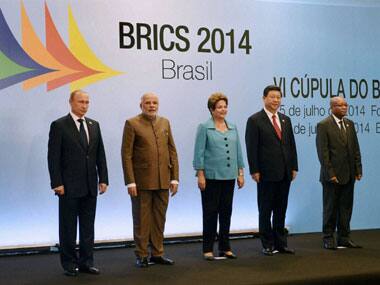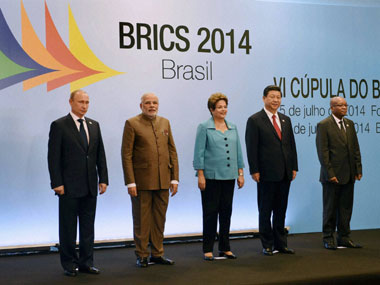The truly groundbreaking achievement in the formal launch of the BRICS Bank with a $100 billion corpus is not that five emerging economies have finally managed to create an alternative to the West-centric World Bank. The real achievement is that the structure of governance for the BRICS Bank is based on the principle of “one country, one vote.” The West never followed such equitable structure of governance in institutions like the World Bank and IMF. The United States has much greater clout, even veto power in these agencies. In the BRICS bank, a small economy like South Africa will have the same voting right as that of China in BRICS bank. Perhaps China and other BRICS countries have done this to signal a future cooperative framework based on the equity principle. This principle therefore might even be extended to the $100 billion Contingency Reserve Fund proposed by BRICS, which is to be tapped in times of sudden capital flight and attack on the currency of any of the BRICS countries. [caption id=“attachment_1621353” align=“alignleft” width=“380”] The BRICS summit 2014 approved the establishment of a BRICS development bank. PTI[/caption] So the BRICS Bank will essentially play the role that the World Bank has: funding long term physical and social infrastructure projects in emerging economies. The Reserve Fund will be more like the IMF which helps countries mitigate short term currency crises. The fact that BRICS nations have pulled off a one-country-one-vote governance structure demonstrates that the idea of BRICS is here to stay and proves wrong all the sceptics in the western press who had suggested these countries will never reach an agreement on critical issues like voting power, location of the Bank and other matters relating to sharing of governance. Till a few years ago, no one gave the Bank a ghost of a chance. Today, it is a reality. The western governments had been underestimating the determination of BRICS nations to do things their own way. The thought process to create alternative institutions and ways of working was set in motion from the very first BRICS summit in Yekaterinburg,Russia in 2009. Later, the summits in Sanya and New Delhi had firmed up ideas around how BRICS economies should move away from dollar denominated trade for good and services exchanged among themselves. India responded by allowing Indian corporates with big infrastructure import requirement from China to borrow in Yuan(not dollars) to fund such imports. This move was also pooh poohed by economists who felt only dollar denominated trade was feasible. But some Indian companies proved the sceptics wrong by getting long term funding arrangements with big Chinese banks. I have been part of several track II deliberations among BRICS nations in the run up to the five summits since 2009 and have been a witness to the steady progress made on various ideas, inspite of a large number of naysayers pooh poohing such efforts. Democratisation of the global multilateral funding system has been a core objective of the BRICS. The new BRICS Bank and the Contingency Reserve are efforts in that direction. The BRICS bank will be located in Shanghai but India will propose a person to head the Bank. Prime Minister Modi will probably choose someone of stature, with experience in financial and economic governance, as the CEO of the Bank. There could be candidates from industry, bureaucracy or even from among veteran politicians with experience of finance. We will know the name in due course. BRICS is expanding cooperation in other critical areas too. On behalf of India, Prime Minister Narendra Modi rightly flagged another big issue which BRICS leaders are seriously deliberating upon: how to democratise the Cyber governance space where the current structure is again very US centric. This had assumed urgency after the Snowden revelations which clearly showed the power of Cyber hegemony in the way American authorities wilfully tapped top government offices and functionaries everywhere in the world. Narendra Modi’s visit to Brazil was preceded by talk of how the Snowden disclosures had even indicated that US agencies were tapping the BJP leaders at will. This would certainly play on Modi’s mind when he discusses decentralisation of Cyber governance with other BRICS leaders in the near future.
The BRICS summit 2014 approved the establishment of a BRICS development bank. PTI[/caption] So the BRICS Bank will essentially play the role that the World Bank has: funding long term physical and social infrastructure projects in emerging economies. The Reserve Fund will be more like the IMF which helps countries mitigate short term currency crises. The fact that BRICS nations have pulled off a one-country-one-vote governance structure demonstrates that the idea of BRICS is here to stay and proves wrong all the sceptics in the western press who had suggested these countries will never reach an agreement on critical issues like voting power, location of the Bank and other matters relating to sharing of governance. Till a few years ago, no one gave the Bank a ghost of a chance. Today, it is a reality. The western governments had been underestimating the determination of BRICS nations to do things their own way. The thought process to create alternative institutions and ways of working was set in motion from the very first BRICS summit in Yekaterinburg,Russia in 2009. Later, the summits in Sanya and New Delhi had firmed up ideas around how BRICS economies should move away from dollar denominated trade for good and services exchanged among themselves. India responded by allowing Indian corporates with big infrastructure import requirement from China to borrow in Yuan(not dollars) to fund such imports. This move was also pooh poohed by economists who felt only dollar denominated trade was feasible. But some Indian companies proved the sceptics wrong by getting long term funding arrangements with big Chinese banks. I have been part of several track II deliberations among BRICS nations in the run up to the five summits since 2009 and have been a witness to the steady progress made on various ideas, inspite of a large number of naysayers pooh poohing such efforts. Democratisation of the global multilateral funding system has been a core objective of the BRICS. The new BRICS Bank and the Contingency Reserve are efforts in that direction. The BRICS bank will be located in Shanghai but India will propose a person to head the Bank. Prime Minister Modi will probably choose someone of stature, with experience in financial and economic governance, as the CEO of the Bank. There could be candidates from industry, bureaucracy or even from among veteran politicians with experience of finance. We will know the name in due course. BRICS is expanding cooperation in other critical areas too. On behalf of India, Prime Minister Narendra Modi rightly flagged another big issue which BRICS leaders are seriously deliberating upon: how to democratise the Cyber governance space where the current structure is again very US centric. This had assumed urgency after the Snowden revelations which clearly showed the power of Cyber hegemony in the way American authorities wilfully tapped top government offices and functionaries everywhere in the world. Narendra Modi’s visit to Brazil was preceded by talk of how the Snowden disclosures had even indicated that US agencies were tapping the BJP leaders at will. This would certainly play on Modi’s mind when he discusses decentralisation of Cyber governance with other BRICS leaders in the near future.
Why the BRICS development bank trumps World Bank
MK Venu
• July 17, 2014, 09:31:12 IST
The real achievement of the BRICS bank is that the structure of governance for the bank is based on the principle of “one country, one vote.”
Advertisement
)
End of Article